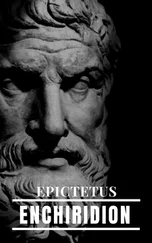Epictetus - The Teaching of Epictetus
Здесь есть возможность читать онлайн «Epictetus - The Teaching of Epictetus» — ознакомительный отрывок электронной книги совершенно бесплатно, а после прочтения отрывка купить полную версию. В некоторых случаях можно слушать аудио, скачать через торрент в формате fb2 и присутствует краткое содержание. Жанр: Философия, foreign_antique, foreign_prose, на английском языке. Описание произведения, (предисловие) а так же отзывы посетителей доступны на портале библиотеки ЛибКат.
- Название:The Teaching of Epictetus
- Автор:
- Жанр:
- Год:неизвестен
- ISBN:нет данных
- Рейтинг книги:5 / 5. Голосов: 1
-
Избранное:Добавить в избранное
- Отзывы:
-
Ваша оценка:
- 100
- 1
- 2
- 3
- 4
- 5
The Teaching of Epictetus: краткое содержание, описание и аннотация
Предлагаем к чтению аннотацию, описание, краткое содержание или предисловие (зависит от того, что написал сам автор книги «The Teaching of Epictetus»). Если вы не нашли необходимую информацию о книге — напишите в комментариях, мы постараемся отыскать её.
The Teaching of Epictetus — читать онлайн ознакомительный отрывок
Ниже представлен текст книги, разбитый по страницам. Система сохранения места последней прочитанной страницы, позволяет с удобством читать онлайн бесплатно книгу «The Teaching of Epictetus», без необходимости каждый раз заново искать на чём Вы остановились. Поставьте закладку, и сможете в любой момент перейти на страницу, на которой закончили чтение.
Интервал:
Закладка:
“Count each affliction, whether light or grave,
God’s messenger sent down to thee; do thou
With courtesy receive him; rise and bow;
And, ere his shadow pass thy threshold, crave
Permission first his heavenly feet to lave;
Then lay before him all thou hast, allow
No cloud of passion to usurp thy brow,
Or mar thy hospitality; no wave
Of mortal tumult to obliterate
The soul’s marmoreal calmness: Grief should be
Like joy, majestic, equable, sedate,
Confirming, cleansing, raising, making free,
Strong to consume small troubles; to commend
Great thoughts, grave thoughts, thoughts lasting to the end.”
But the grief that shall do this is a grief that must be felt . And Epictetus assuredly never meant to offer the Stoic philosophy as a mere stupefying anodyne. Make the man a Stoic, and something yet remains to do – to make the Stoic a man. One of these purposes was not more the concern of Epictetus than the other. And he pursued both of them with a strength, sincerity, and sanity of thought, with a power of nourishing the heroic fiber in humanity, which, to my mind, make him the very chief of Pagan moralists.
It is no purpose of mine to fill this preface with information which the reader can gain without doubt or difficulty from the author whom it introduces, and therefore I shall leave him to discover for himself what the positive ethical teaching of Epictetus was like. Nor is it, unhappily, possible to say much upon another subject on which Epictetus gives us little or no information – his own life and circumstances. Arrian wrote a biography of him, but it is now entirely lost, and the biographical details which have been collected from Simplicius, Suidas, Aulus Gellius, and others are very scanty. He was born at Hierapolis, in Phrygia, and became, how is unknown, a slave of Epaphroditus, a freedman and favorite of Nero, who is recorded to have treated him with great cruelty. One day, it is said, Epaphroditus began twisting his leg for amusement. Epictetus said, “If you go on you will break my leg.” Epaphroditus persisted, the leg was broken, and Epictetus, with unruffled serenity, only said, “Did I not tell you that you would break my leg?” This circumstance is adduced by Celsus in his famous controversy with Origen as an instance of Pagan fortitude equal to anything which Christian martyrology had to show; 6 6 Gregory Nazianzen, commenting on this narrative, remarks that it only shows how manfully unavoidable sufferings may be borne.
but it is probably a mere myth which grew up to account for the fact mentioned by Simplicius and Suidas that Epictetus was feeble in body and lame from an early age.
Epaphroditus was probably a very bad master, and as a favorite and intimate of Nero’s must have been a bad man; but we have to thank him for the fact that Epictetus, while yet a slave, was sent to attend the philosophic lectures of Musonius Rufus, an eminent Stoic of Rome, whom both Epictetus and Marcus Aurelius mention with great respect. The system of philosophic training had been at this time long organized. There were masters of repute everywhere, who delivered their instruction in regular courses, received a fixed payment for the same, and under whom crowds of young men assembled from far and near to study science and ethics – to receive, in short, what corresponded to a university education in those days. The curious circumstance that a slave like Epictetus could participate in advantages of this kind is generally explained as the result of a fashionable whim which possessed Roman nobles at this time for having philosophers and men of culture among their slaves. Professor Mahaffy, in his Greek Life and Thought (p. 132), commenting on the summons of the two philosophers, Anaxarchus and Callisthenes, to console Alexander after his murder of Cleitus, observes, that it was probably usual to call in philosophers to minister professionally in cases of affliction. From this, to making a philosopher a regular adjunct to a large household, even as the baron of later times kept a fool, the step is not great. But Epaphroditus, one thinks, must have had frequent reason to rue the choice he made in Epictetus, if he expected his domestic philosopher to excuse his misdeeds as Anaxarchus did those of Alexander on the occasion above mentioned.
In the year 94 a. d. the emperor Domitian issued a decree expelling all philosophers from Rome – an easily explainable proceeding on his part if there were any large number of them who, in the words of Epictetus, were able “to look tyrants steadily in the face.” Epictetus must have by this time obtained his freedom and set up for himself as a professor of philosophy, for we find him, in consequence of this decree, betaking himself to Nicopolis, a city of Epirus. Here he lived and taught to a venerable age, and here he delivered the discourses which Arrian has reported for us. He lived with great simplicity, and is said to have had no servant or other inmate of his house until he hired a nurse for an infant which was about to be exposed, according to the practice of those days when it was desired to check the inconvenient growth of a family, and which Epictetus rescued and brought up. The date of his death is unknown.
And now, reader, I will take my leave of you with Arrian’s farewell salutation to Lucius Gellius, which, literally translated, is Be strong . If you need it, I know no teacher better able to make or keep you so than Epictetus. At any rate, to give him a fair chance of doing what it is in him to do for English-speaking men and women is something I have regarded as a sort of duty, a discharge of obligation for his infinite service to myself; which done to the utmost of my powers, the fewest forewords are the best.
T. W. R.
CLEANTHES’ HYMN TO ZEUS. 7 7 Professor Mahaffy, in his Greek Life and Thought , quotes the full text of this noble Hymn, which, he thinks, “would alone redeem the Hellenistic age, as it stands before us, from the charge of mere artificiality and pedantry.”
Most glorious of the Immortals, many named, Almighty forever.
Zeus, ruler of nature, that governest all things with law,
Hail! for lawful it is that all mortals should address Thee.
For we are Thy offspring, taking the image only of Thy voice, 8 8 ἰῆς μίμημα λαχόντες μοῦνον. This is Zeller’s reading, but not Professor Mahaffy’s who has ἑνὸς μίμημα.
as many mortal things as live and move upon the earth.
Therefore will I hymn Thee, and sing Thy might forever.
For Thee doth all this universe that circles round the earth obey, moving whithersoever Thou leadest, and is gladly swayed by Thee.
Such a minister hast Thou in Thine invincible hands; – the two-edged, blazing, imperishable thunderbolt.
For under its stroke all Nature shuddereth, and by it Thou guidest aright the Universal Reason, that roams through all things, mingling itself with the greater and the lesser lights, till it have grown so great, and become supreme king over all.
Nor is aught done on the earth without Thee, O God, nor in the divine sphere of the heavens, nor in the sea,
Save the works that evil men do in their folly —
Yea, but Thou knowest even to find a place for superfluous things, and to order that which is disorderly, and things not dear to men are dear to Thee.
Thus dost Thou harmonize into One all good and evil things, that there should be one everlasting Reason of them all.
And this the evil among mortal men avoid and heed not; wretched, ever desiring to possess the good, yet they nor see nor hear the universal Law of God, which obeying with all their heart, their life would be well.
But they rush graceless each to his own aim,
Some cherishing lust for fame, the nurse of evil strife,
Some bent on monstrous gain,
Some turned to folly and the sweet works of the flesh,
Hastening, indeed, to bring the very contrary of these things to pass.
But Thou, O Zeus, the All-giver, Dweller in the darkness of cloud, Lord of thunder, save Thou men from their unhappy folly,
Which do Thou, O Father, scatter from their souls; and give them to discover the wisdom, in whose assurance Thou governest all things with justice;
So that being honored, they may pay Thee honor,
Hymning Thy works continually, as it beseems a mortal man.
Since there can be no greater glory for men or Gods than this,
Duly to praise forever the Universal Law.
Интервал:
Закладка:
Похожие книги на «The Teaching of Epictetus»
Представляем Вашему вниманию похожие книги на «The Teaching of Epictetus» списком для выбора. Мы отобрали схожую по названию и смыслу литературу в надежде предоставить читателям больше вариантов отыскать новые, интересные, ещё непрочитанные произведения.
Обсуждение, отзывы о книге «The Teaching of Epictetus» и просто собственные мнения читателей. Оставьте ваши комментарии, напишите, что Вы думаете о произведении, его смысле или главных героях. Укажите что конкретно понравилось, а что нет, и почему Вы так считаете.












